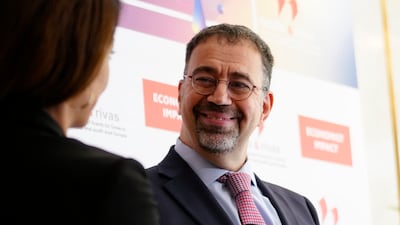The Nobel Prize for Economics has been awarded to three experts who study the lasting impact of Europe’s former empires on growth.
Daron Acemoglu and Simon Johnson – a former chief economist at the International Monetary Fund – along with James Robinson, were praised for their work on why countries with poor rule of law and exploitative institutions fail to generate sustainable growth.
Research by the three academics showed how the path for prosperity can vary partly because of structures established in countries colonised by Europeans.
“In places where Europeans faced high mortality rates, they could not settle and were more likely to set up extractive institutions,” the economists wrote in a joint paper published in 2001. “These institutions persisted to the present.”

Mr Acemoglu and Mr Robinson wrote the 2012 bestseller Why Nations Fail: The Origins of Power, Prosperity and Poverty, which argued that man-made problems were responsible for countries being underprivileged.
In their work, the winners looked at the city of Nogales, which straddles the US-Mexico border. Despite sharing the same geography, climate, ancestry and common culture, life differs starkly on either side of the border.
In Arizona, to the north, residents are relatively well-off and live long lives; most children graduate from high school. To the south, in Mexico’s Nogales, “residents here are in general considerably poorer. Organised crime makes starting and running companies risky. Corrupt politicians are difficult to remove," the Nobel committee wrote. The difference, the economists found, is a US system that protects property rights and gives citizens a say in their government.
“Broadly speaking, the work that we have done favours democracy,” Mr Acemoglu, a Turkish-American economist of Armenian descent, said after the prize was announced. “Countries that democratise starting from non-democratic regimes do ultimately grow, in about eight to nine years, faster than non-democratic regimes, and it’s a substantial gain. But democracy is not a panacea. Introducing democracy is very hard.”

The prize, formally known as the Sveriges Riksbank Prize in Economic Sciences in Memory of Alfred Nobel, was established in 1968 by the Swedish central bank. It complements annual prizes for achievements in physics, chemistry, medicine, literature and peace, which were established in the will of Alfred Nobel – the Swedish inventor of dynamite who died in 1896.
Last year, Claudia Goldin received the accolade for her research into gender pay gaps, and the year before, former Federal Reserve chairman Ben Bernanke, Douglas Diamond and Philip Dybvig shared the award for research on banks and financial crises.
Other laureates include Friedrich Hayek for work in the theory of money and economic fluctuations, William Nordhaus for integrating climate change into long-run macroeconomic analysis and Paul Krugman for his analysis of world trade.
The Nobel Prizes, awarded since 1901, are famously unequal, reflecting how women have been overshadowed by men in science for centuries. Only three women have received the economics award, which makes its roster of laureates the second most male-dominated, after physics.



